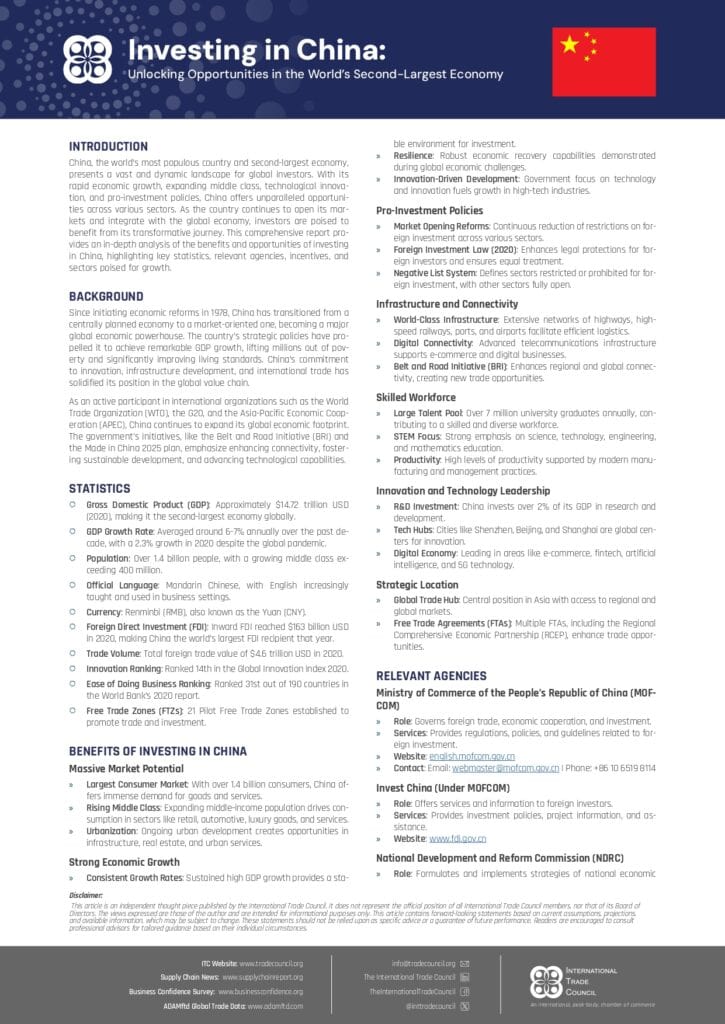-
- Type of Government: Socialist Republic
- Population: Approximately 1.4 billion
- GDP: Around $17 trillion USD
- Corporate Tax Rate: 25%
- Personal Income Tax Rate: Progressive, up to 45%
- Major Exports: Electronics, machinery, textiles, furniture, toys
- Major Imports: Electronics, machinery, crude oil, vehicles, minerals
Doing Business with China
A comprehensive guide to doing business, exporting, investing, and manufacturing in China.
Exporting to China involves several steps to ensure compliance with regulations. Here’s a detailed guide:
-
Conduct Market Research
- Identify demand for your product in China.
- Understand the competitive landscape and consumer preferences.
-
Verify Product Compliance
- Ensure your product meets China’s standards and regulations.
- Contact relevant authorities for specific requirements.
-
Check Tariffs and Duties
- Review applicable import duties and taxes for your goods.
- Utilize any free trade agreements that may apply.
-
Arrange Logistics and Shipping
- Choose a reliable shipping company with experience in China.
- Ensure all shipping documents are accurately completed.
-
Prepare Documentation
- Include commercial invoices, packing lists, and certificates of origin.
- Verify compliance with Chinese customs requirements.
-
Customs Clearance
- Work with a customs broker to facilitate the clearance process.
- Pay any duties and taxes required for import.
-
Distribution and Sales
- Establish distribution channels within China.
- Consider partnerships with local businesses for effective market penetration.
Key Contacts
- China Customs
- Website: China Customs
- Ministry of Commerce of the People’s Republic of China (MOFCOM)
- Website: MOFCOM
Importing goods into China involves several steps to ensure compliance with local regulations. Here’s a detailed guide:
-
Register Your Business
- Ensure your business is registered in China.
- Obtain an Import-Export License from the Ministry of Commerce.
-
Classify Your Goods
- Use the Harmonized System (HS) codes to classify your goods accurately.
-
Verify Import Regulations
- Check if your goods require special permits or certificates.
- Consult the Chinese Inspection and Quarantine Services for specific requirements.
-
Check Tariffs and Taxes
- Identify applicable import duties and taxes for your goods.
- Utilize any free trade agreements that may apply.
-
Arrange Logistics and Shipping
- Select a reputable shipping company.
- Ensure all shipping documents are accurately completed.
-
Prepare Import Documentation
- Include commercial invoices, packing lists, and certificates of origin.
- Ensure compliance with Chinese customs requirements.
-
Customs Clearance
- Work with a customs broker to facilitate the clearance process.
- Pay any duties and taxes required for import.
-
Receive and Distribute Goods
- Arrange for the delivery and distribution of goods upon clearance.
- Set up local partnerships if needed.
Key Contacts
- General Administration of Customs
- Website: China Customs
- Ministry of Commerce of the People’s Republic of China (MOFCOM)
- Website: MOFCOM
Incorporating a company in China involves several key steps. Here’s a detailed guide:
-
Choose a Business Structure
- Decide on the type of company, such as a Wholly Foreign-Owned Enterprise (WFOE), Joint Venture (JV), or Representative Office.
-
Select a Business Name
- Ensure your company name is unique and complies with naming regulations.
- Conduct a name check with the State Administration for Market Regulation (SAMR).
-
Prepare Required Documentation
- Draft the Articles of Association and other necessary documents.
- Include information on directors, shareholders, and registered capital.
-
Submit Application for Pre-Approval
- Submit your application to the local Administration for Market Regulation (AMR).
- Obtain a pre-approval for the company name.
-
Register the Company
- File incorporation documents with the AMR.
- Obtain a business license upon approval.
-
Obtain Additional Licenses and Permits
- Depending on your industry, apply for any necessary permits.
- Contact relevant authorities for specific requirements.
-
Open a Bank Account
- Open a corporate bank account in China for capital injection.
-
Register for Taxation
- Register for taxes with the State Taxation Administration (STA).
-
Social Security Registration
- Register your company for social insurance and housing fund contributions.
Costs
- Registration Fees: Vary depending on the business structure and location.
- Additional Fees: May include legal, notary, and service fees.
Key Contacts
Setting up a manufacturing plant in China involves several steps. Here’s a detailed guide:
-
Conduct Market Research
- Analyze local demand and industry trends.
- Evaluate potential competitors and supply chain logistics.
-
Choose a Suitable Location
- Identify industrial zones with necessary infrastructure.
- Contact local government for available sites and incentives.
-
Register Your Business
- Incorporate your company through the State Administration for Market Regulation (SAMR).
- Obtain a business license.
-
Obtain Necessary Permits
- Apply for construction, environmental, and zoning permits.
- Contact local government offices for specific requirements.
-
Secure Financing
- Explore funding options through banks or investment agencies.
- Consider government incentives for manufacturing.
-
Design and Construct the Facility
- Hire architects and contractors familiar with local regulations.
- Ensure compliance with building codes and safety standards.
-
Install Equipment and Machinery
- Import necessary machinery, ensuring compliance with local regulations.
- Coordinate with customs for smooth importation.
-
Recruit and Train Staff
- Hire local talent and provide necessary training.
- Contact local employment services for assistance.
-
Register for Taxation
- Ensure your business is registered for applicable taxes with the State Taxation Administration (STA).
-
Begin Operations
- Ensure all systems are in place and test the production line.
- Implement quality control measures.
Key Contacts
- State Administration for Market Regulation (SAMR)
- Website: SAMR
- Ministry of Commerce of the People’s Republic of China (MOFCOM)
- Website: MOFCOM
- China Customs
- Website: China Customs
Registering a trademark in China involves several steps to ensure legal protection. Here’s a detailed guide:
-
Conduct a Trademark Search
- Use the China National Intellectual Property Administration (CNIPA) database to check availability.
-
Prepare Your Application
- Gather necessary information: trademark design, goods/services classification, and applicant details.
-
Submit Your Application
- File the application online or through an agent with CNIPA.
-
Pay the Application Fee
- Fees vary depending on the number of classes; typically around 300 CNY per class.
-
Examination Process
- CNIPA reviews the application for compliance and conflicts.
- Respond to any objections or requests for additional information.
-
Publication and Opposition
- If approved, the trademark is published for opposition.
- There is a three-month period for third parties to oppose the registration.
-
Registration and Certification
- If no oppositions arise, the trademark is registered.
- Receive a certificate of registration.
-
Maintain and Renew the Trademark
- Trademarks are valid for 10 years and can be renewed indefinitely.
- Submit renewal applications before expiry to maintain protection.
Costs
- Application Fee: Approximately 300 CNY per class.
- Renewal Fee: Contact CNIPA for current rates.
Key Contacts
- China National Intellectual Property Administration (CNIPA)
- Website: CNIPA
Resolving commercial disputes in China involves several steps and options. Here’s a guide on the process:
-
Attempt Negotiation
- Begin by negotiating directly with the other party to find an amicable solution.
-
Mediation
- Engage a mediator to facilitate discussions.
- This can be a quicker and less formal alternative to court proceedings.
-
Arbitration
- Consider arbitration through institutions like the China International Economic and Trade Arbitration Commission (CIETAC).
- Arbitration is generally faster and confidential.
-
Seek Legal Advice
- Consult with a lawyer specializing in commercial law for guidance on your case.
-
File a Lawsuit
- If other methods fail, file a lawsuit in the appropriate People’s Court.
- Court fees vary; consult the specific court for details.
-
Court Proceedings
- Prepare for the legal process, including hearings and presenting evidence.
-
Judgment and Enforcement
- If a judgment is made, ensure its enforcement through legal channels.
Costs
- Mediation and Arbitration Fees: Vary depending on the service provider.
- Court Filing Fees: Depend on the jurisdiction and case type; consult local courts.
- Legal Fees: Vary based on the lawyer and complexity of the case.
Key Contacts
- China International Economic and Trade Arbitration Commission (CIETAC)
- Website: CIETAC
- Supreme People’s Court of the People’s Republic of China
- Website: Supreme People’s Court
When considering doing business in China, it’s important to understand various factors that can influence operations. Here’s an overview of social, cultural, political, and economic aspects:
Social and Cultural Factors
- Language and Communication
- The official language is Mandarin Chinese.
- Business communication is formal, and understanding cultural nuances is important.
- Business Etiquette
- Building relationships and trust is crucial.
- Respect for hierarchy and maintaining “face” are significant.
Political Environment
- Government Structure
- China is a socialist republic led by the Communist Party.
- Known for its centralized decision-making and regulatory environment.
- Regulatory Environment
- The regulatory framework can be complex; it’s essential to stay informed about changes.
- Foreign businesses may face additional scrutiny.
Economic and Foreign Exchange Factors
- Currency
- The currency is the Renminbi (RMB), also known as the Yuan.
- Exchange rates can be influenced by government policies.
- Investment Climate
- Strong sectors include technology, manufacturing, and finance.
- China is part of numerous free trade agreements, enhancing market access.
Rule of Law
- Legal System
- Based on civil law.
- Enforcement of contracts can vary; legal counsel is advisable.
- Intellectual Property
- Protection has improved but remains a concern for foreign businesses.
Infrastructure
- Transportation and Logistics
- Well-developed infrastructure, including ports, railways, and highways.
- Efficient logistics for import and export activities.
Relevant URLs
Ask our Experts on Doing Business in/with China
If you’re looking to do business or invest in China, we can provide expert guidance, market insights, and valuable connections to help you navigate the local landscape. Contact us today to discover how we can assist in making your venture a success.



















